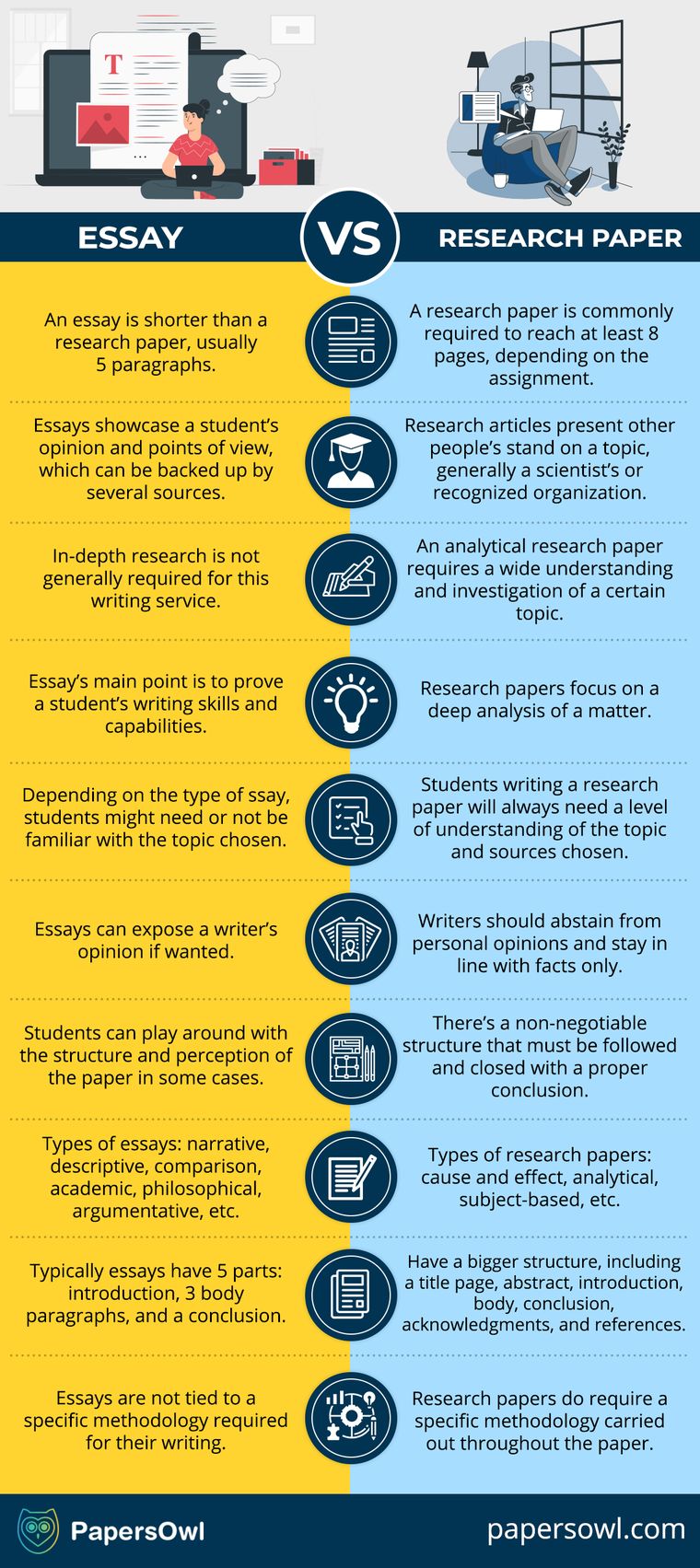The main difference between an essay and a research paper lies in their purpose and structure.
- An essay typically presents the author’s personal viewpoint on a topic, while a research paper involves extensive research and analysis to explore a specific question.
- Essays are shorter, with a simpler structure, while research papers require deeper investigation, more sources, and a formal format.
If these distinctions still seem confusing or the workload is too heavy, you might consider the option to pay someone to write an essay to manage your academic commitments effectively.
Understanding these distinctions can help students meet academic expectations and improve their writing skills.
In this article, we will explore the key differences between an essay and a research paper in detail. You’ll learn about their definitions, structural elements, and specific requirements, helping you master both types of academic writing.
Definition of an Essay
An essay is a short piece of writing that presents a personal opinion on a specific topic. Essays can be formal or informal, but in an academic setting, they are usually formal. The main purpose of an essay is to inform the reader or argue a particular perspective.
Essays do not always aim to be scientific but require a clear structure. This structure typically includes an introduction, a body, and a conclusion. Following this format lets you organize your thoughts and communicate them effectively.
With their versatility, essays can cover various topics, from complex ideas to everyday subjects. What makes your essay unique is the creativity and originality of your ideas.
Before you begin, it is important to drafting an essay carefully. This process involves brainstorming fresh ideas and planning how to present them. Although your classmates might use the same basic structure, your writing skills and unique perspective will help your essay stand out. Focus on making your ideas compelling, rather than just sticking to the format.
Definition of a Research Paper
A research paper explores a specific scientific topic in detail. It provides analysis, interpretation, and argument based on careful study. Unlike essays, research papers focus less on personal opinions and more on thorough examination of the subject. They require you to use different sources and add new insights to the academic discussion.
In a research paper, it is not enough to just present facts or share personal views. You need to study the topic in depth, understand what others have said about it, and clearly outline your approach. This type of assignment involves more than just collecting information. You must also evaluate the information to build a strong argument.
Teachers expect you to show your ability to analyze information, choose reliable sources, and have a deep understanding of the topic. Research papers require you to go beyond basic knowledge and present your findings in a clear and organized way.
A typical research paper consists of several key elements that are crucial for presenting your argument and findings clearly:
- Introduction: The paper begins with an introduction that sets the stage and includes a thesis statement.
- Body: The body follows, providing detailed analysis and evidence to support the thesis, using information from reliable sources.
- Research Paper Outline: Creating an outline helps organize these sections, ensuring a logical flow of ideas throughout the paper.
- Conclusion: This part ends with a summary of the main points and a restatement of the thesis.
Whether writing a research paper or a term paper, maintaining this clear structure is essential for demonstrating a thorough understanding of your topic.

Research Paper vs Essay: Key Differences
The central difference is the goal of these academic assignments.
The essay aims to express an individual point of view and find a creative, fresh approach to an existing topic.
A good research paper seeks to introduce scientific novelty by examining existing data and conducting new experiments to analyze the information obtained.
| Criteria | Research Paper | Essay |
|---|---|---|
| Focus | Explores and presents various viewpoints on a topic while also including the writer’s insights and ideas. | Primarily expresses the writer’s point of view. |
| Length | Typically spans at least 8 pages in length. | Typically short, with an average length of 5 paragraphs. |
| Depth of Understanding | Requires a deep understanding of the topic, gained through thorough research. | Does not always require an in-depth understanding of the topic. |
| Familiarity with Sources | Demands familiarity with research writings related to the chosen subject. | May or may not need familiarity with other research or writings. |
| Skill Development | Enhances the writer’s knowledge about the topic. | Develops the writer’s skills in presenting ideas clearly and effectively. |
| Approach | Examines and compares different sources of information on a topic, ultimately presenting an overview of the findings. | The writer practices organizing thoughts logically and coherently. |
| Types and Variations | Research papers come in various forms such as compare and contrast, argumentative, analytical, cause and effect, and subject-based papers, with the latter being the most common. A specific subject or topic is chosen, researched, and then written about in detail. | Essays come in different types such as academic, narrative, and philosophical. Academic essays often include a literature review that evaluates, describes, summarizes, and clarifies the selected material. |
| Process and Presentation | After gathering detailed information on the topic, the writer organizes and presents it from their perspective, using citations from the research to support their analysis. | In an essay, the writer conveys personal thoughts and ideas. The purpose and type of essay are considered, along with the intended audience. The writing must be well-structured, clear, and supported by relevant facts and examples. |
Purpose and Objective
The first and main difference between an essay and a research paper is the purpose of writing.
An essay as an academic task has the goal of developing students’ creative thinking. It also teaches us a structured presentation of thoughts regarding a certain topic. The student is required to have a non-standard approach, fresh thoughts, and reasoned conclusions on the given topic.
The purpose of the research work is to study a scientific topic in detail. This academic assignment is aimed at assessing the student’s analytical abilities and competence to determine cause-and-effect relationships, filter sources, and formulate logical conclusions. Such work requires theoretical knowledge, preliminary study of existing scientific works, and the ability to formulate goals and research methods.
Moreover, a student is supposed to show the capacity to draw comprehensive conclusions based on available data and information obtained during independent research.
Structure and Organization
To start with, the basic structure of any college essay involves a text consisting of five paragraphs, divided into three main factions: introduction, body part, and conclusion. When students lack time to compose a nicely structured academic essay, they can always pay to write a research paper and have their tasks done by a professional.
- The introduction presents the topic, sets the main direction for further text, and also works as a bait to motivate the reader to study further work.
- The introduction is followed by three body paragraphs. Each of the three body paragraphs presents a separate idea.
- The last paragraph of any essay is a conclusion. In this paragraph, the college or university student must resume the arguments and ideas presented in the text, summarizing them into the main message of the essay. Often, the idea that you present in your conclusions will be most memorable to the reader.
Consequently, let’s overview the structure of a research paper. Compared to the structure of an essay, the organization of a research paper is much more ornate.
This type of work requires a title page and abstract that go before the main body of text.
- On the title page, the student describes his topic of work, as well as gives contact details.
- An abstract is a short description of the main ideas and research methods of your work.
- The research work itself consists of an introduction, background, main part, and conclusions.
Also, at the very end, they often add acknowledgments and a list of references, which must be formatted following the required international format.
Length and Depth
The length and depth of analysis between these two academic assignments also differ significantly.
As for the essay, it is often a short prose piece whose length does not exceed 1000 words. You are faced with the task of fitting a large array of ideas into a small amount of text. The essay format itself rarely requires rigorous and thorough research of the topic, but you should work on creativity and the presence of a message in your essay. Most academic papers fall in the 300 to 600-word range.
On the other hand, a research paper is a scientific project that includes many theoretical aspects that require analysis and clarification. Thus, the volume is significantly bigger. Basic research paper lengths range from 4,000 to 6,000 words.
In this case, you will no doubt have to conduct a comprehensive analysis of the selected sources, or ask PapersOwl to do a research paper for you. Formulating a research vector, conducting experiments, and presenting findings are essential parts of this process. A research paper is a scientific project that includes many theoretical aspects that require analysis and clarification.
Sources and Evidence
The presence of theoretical sources and references is not a mandatory requirement for an essay. You can state your own thoughts on a given topic without resorting to the help of existing sources. Present your ideas on the topic, giving arguments that seem logical to you.
If you do decide to base your paper on existing works, you must be sure to indicate where the information was taken from. And yet, the teacher needs to see your own thoughts rather than a dry listing of existing ideas.
Unlike an essay, a quality research paper must include primary and secondary sources, as well as a specific citation format. Surely, you are not the first person to study this scientific topic. In order not to repeat existing thoughts, you need to conduct a search to form a reliable basis for your study. If you skip this step, you risk basing your paper on misleading scientific findings.
Voice and Style
The very specificity of the essay as an academic paper is the subjective presentation of information. A large percentage of your essay should consist of your perspective and vision of the chosen topic. For this reason, essays often use a less formal and more subjective tone.
However, you can still use a large amount of colloquial vocabulary, completely disregarding the norms of formal style.
Students often have trouble figuring out the right style for their university assignments. In such cases, a reasonable solution is to seek help from a specialist. When you turn to a write my term papers service, you’ll always get a perfectly balanced academic paper.
On the other hand, a research paper is a serious scientific work. The student must maintain a formal tone while complying with all structural requirements. Also, in investigative work, there is little room for subjectivity and a personal approach since an objective style is required. At the same time, do not oversaturate your research work with formalism and standard clichés.
Audience and Presentation
The essay format can be used both in the educational process and in an independent literary style. Therefore, the audience for such a written assignment can be wide and varied. When you’re writing an essay, make sure it’s understandable in academia and for a wide audience.
Research work, on the contrary, is aimed at a range of professionals in the chosen field. Written in scientific language, the goal of this work is to attract the attention of scientists and students of certain majors. Your scientific work should be rich in theory and related terms.
Difference Between Research Paper and Other Paper Types
There are many types of papers, each focusing on different topics, serving different purposes, and requiring a specific structure. Those are different types of papers that share a common ground but differ in the way they present information and arguments.
- Analytical paper. The purpose of such an essay is an in-depth analysis of the chosen topic, studying different approaches and points of view, and formulating one’s own conclusions based on the information studied and scientific evidence.
- Argumentative paper. This type of essay takes as a basis an ambiguous topic; the author must take a certain position and provide a number of arguments.
- Informative paper. It has an informative purpose — a presentation of information to the reader, preceded by careful analysis and selection of data.
- Persuasive paper. The purpose of this paper is to present convincing arguments, using chosen writing techniques, confirming the author’s position regarding the selected scientific topic.
To get a high grade, you need to understand the requirements of academic requirements.
No matter how informatively rich your work is, if it does not meet the requirements, it cannot be highly appreciated.
Each type of academic assignment has its own clearly defined, unique format. It’s necessary to know the difference between a research paper vs argumentative essay so as not to get confused while completing a college assignment.
So before you start writing an assignment, make sure you understand the type of academic writing required of you.

Let’s Sum Up
Research papers and essays are aimed at testing various skills of the student, following different structures, and having several requirements.
- An essay is a more creative writing task, which involves showing originality and expressing a personal opinion on a certain topic.
- At the same time, a research paper is a type of scientific writing that adheres to a strict structure and uses a formal tone.
Understanding the main differences will make your writing process easier, saving you time researching the requirements.
Remember that knowing the essence of the assignment is a key factor in writing a decent paper.



